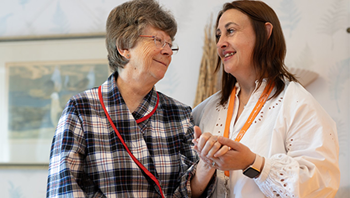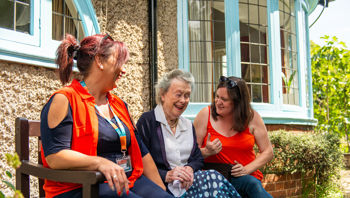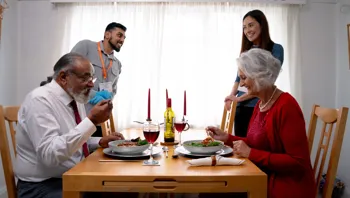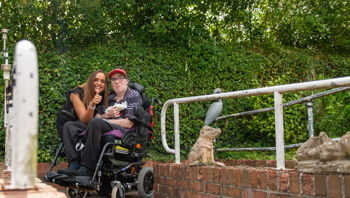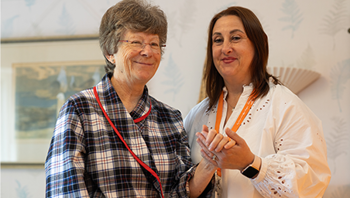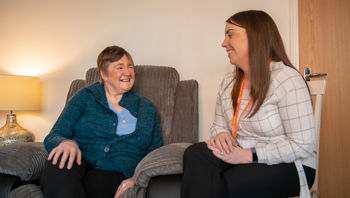Comprehensive Stroke Rehabilitation & Home Care Services | Right at Home
Strokes can be life-altering events that require immediate and long-term care strategies. Understanding what a stroke is and the rehabilitation process is crucial for those affected and their families.

Published: 07/06/2024
Understanding Stroke Rehabilitation and Home Care
Strokes can be life-altering events that require immediate and long-term care strategies. Understanding what a stroke is and the rehabilitation process is crucial for those affected and their families.
What is a Stroke?
A stroke occurs when the blood supply to part of your brain is interrupted or reduced, preventing brain tissue from getting oxygen and nutrients. Brain cells begin to die in minutes. There are two main types of strokes: ischemic, due to lack of blood flow, and hemorrhagic, caused by bleeding.
Immediate and Long-Term Effects of a Stroke
The immediate effects of a stroke may include paralysis, trouble speaking, and memory loss. Long-term, a survivor might experience severe cognitive declines, emotional changes, or permanent physical disabilities, impacting their independence.
The Path to Recovery After a Stroke
Recovery begins in the hospital and can continue at home. Rehabilitation aims to help the individual regain as much independence as possible. It involves relearning skills and new ways to perform tasks.
Comprehensive Stroke Rehabilitation at Home
Tailoring Post-Stroke Care at Home
Stroke rehabilitation home care services start with a thorough assessment to understand the stroke survivor's needs and limitations. A care plan is tailored to encourage recovery while respecting the patient's current abilities.
Essential Components of Stroke Homecare
Effective homecare involves various therapies based on the patient's needs, including physical therapy to regain movement and strength and occupational therapy to help with everyday tasks.
The Role of Home Care Professionals in Stroke Recovery
Trained caregivers play a pivotal role in the recovery process. They provide physical assistance, medical care, and emotional support, helping manage the psychological effects of stroke.
Right at Home's Approach to Stroke Homecare
Services Offered by Right at Home Cheshire East
We offer various services tailored for stroke survivors, including personal care, mobility assistance, and medication management. Our caregivers are highly trained, experienced in stroke care, and equipped with the latest homecare technology to ensure efficient and effective care. All our services are delivered with a focus on dignity and respect, and we strive to create a supportive environment for our clients.
Integrating Technology and Expertise in Stroke Care
Leveraging the latest homecare technology, Right at Home Cheshire East enhances traditional care methods. This integration ensures that care is efficient, effective, and adaptable to changing needs.
Preventing Strokes and Maintaining Health
Lifestyle Adjustments to Prevent Strokes
Preventive measures include maintaining a healthy diet, regular exercise, and managing high blood pressure. Right at Home Cheshire East educates clients on these practices to help reduce the risk of future strokes.
Educating Clients and Families About Stroke Prevention
We provide resources and conduct community workshops on stroke prevention, helping clients and their families understand how to minimise risk factors.
To Conclude
Understanding and managing stroke recovery requires comprehensive care and a supportive environment, which Right at Home strives to provide.
For more information on how we can assist in stroke rehabilitation, please get in touch with us on 0161 871 7381

Article Outline
Understanding Stroke Rehabilitation and Homecare
What is a Stroke?
-
Definition and types of strokes.
-
How strokes affect the brain and body.
Immediate and Long-Term Effects of a Stroke
-
Common immediate impacts.
-
Long-term physical and cognitive consequences.
The Path to Recovery After a Stroke
-
The phases of stroke recovery.
-
Importance of rehabilitation post-stroke.
Comprehensive Stroke Rehabilitation at Home
Tailoring Post-Stroke Care at Home
-
Assessing the needs of a stroke survivor.
-
Developing a personalized care plan.
Essential Components of Stroke Homecare
-
Physical therapy and exercises.
-
Speech and occupational therapy at home.
The Role of Home Care Professionals in Stroke Recovery
-
Qualifications and skills of caregivers.
-
How caregivers support daily activities and rehabilitation.
Right at Home’s Approach to Stroke Homecare
Services Offered by Right at Home
-
Specific services are provided, such as mobility assistance and personal care.
-
Additional support like transportation and household tasks.
Integrating Technology and Expertise in Stroke Care
-
Use of technology to enhance care.
-
Expert consultations and continuous training of caregivers.
Preventing Strokes and Maintaining Health
Lifestyle Adjustments to Prevent Strokes
-
Dietary tips and physical activities that help prevent strokes.
- Managing risk factors such as hypertension.
Educating Clients and Families About Stroke Prevention
-
Informational resources provided by Right at Home.
-
Community engagement and awareness programs.
In Conclusion
-
Recap of the importance of tailored stroke rehabilitation and homecare.
-
Encouragement to contact Right at Home for more information and support.
FAQs on personal care at home
What is the first step in starting stroke home care?
The first step is to schedule a free care assessment to determine your loved one's needs and discuss potential care options.
Call us on 0161 871 7381 | 09.00 - 17.00 - Mon - Fri
How long does stroke recovery typically take?
Recovery can vary widely. Some people regain function quickly, while others may gradually improve over months or years.
What are the signs that someone needs more intensive stroke rehabilitation?
If there is slow progress, worsening symptoms, or new health issues, more intensive rehabilitation might be needed.
Can stroke rehabilitation services be customised if the patient's condition changes?
Absolutely. Reputable services like ours are designed to adapt the care plan as the patient's needs evolve, providing a sense of security and confidence.
Our home care services are fully customisable to meet each individual's unique needs and preferences. Your care manager and coordinator will discuss these details during your assessment call.
How do you ensure quality in your caregivers?
Our caregivers undergo rigorous selection and training processes to ensure they meet our high standards of care and compassion.
We are also regularly and independently reviewed by our clients and their relatives on homecare.co.uk.
Here, you can read all of our independent reviews, written by past and present clients, on the caring and compassionate services we offer.
What types of other home care services do you offer?
We offer various services, from simple caregiving and company to complex care at-home needs, including personal care, companionship, dementia care, palliative care, and more.
A full list of our services can be viewed on Our Care Services page, or jump to the one you are interested in by using the links below:
More Information on Strokes & Hypertension
Here is some additional information and resources on Strokes and Hypertension:
- Stroke is the third leading cause of death in the United Kingdom
- Up to 80 per cent of strokes are preventable
- For a great resource on living with hypertension, visit the British Hypertension Society.
- For more information on strokes, visit The Stroke Association
Visit our Information Hub for guidance on Health Awareness.
Our Trusted Services
Families just like yours, trust and rely on Right at Home to provide high-quality homecare services for their loved ones. We offer a wide range of services to support Clients to remain living safely and independently in the comfort of their own home.
